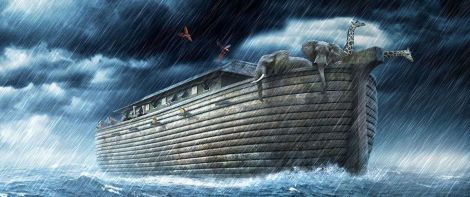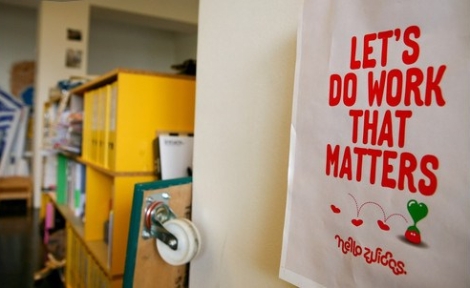
The story of the flood is always a bit of a hot button issue. The science minded find much to doubt in how animals from all corners of the globe could cross bodies of water to come to the ark. Others problematize the notion of an “All-Loving God” by calling out His extermination of not only almost all human life, but animal life on the planet. And even many Rabbis cite fault in Noah for having stood by, missing the opportunity to change God’s mind.
But despite our difficulty with the story in retrospect, the person who had the most trouble with the mabul (Hebrew for flood) may have been Noah himself.
A Far Off Deadline
God comes to Noah and tells him of His plan for the mabul and to restart humanity with Noah and his family. But then He tells him it is going to happen in 120 years (let’s not get into how long people lived back then.) So during that time, Noah plants a forest worth of trees, cultivates them, harvests them, and builds the ark, all the while letting people know about the approaching cataclysm. But when everything is set, ready to go, Noah does something a little odd.
And the Lord said to Noah, “Come into the ark, you and all your household, for it is you that I have seen as a righteous man before Me in this generation… For in another seven days, I will make it rain upon the earth for forty days and forty nights, and I will blot out all beings that I have made, off the face of the earth.” And Noah did, according to all that the Lord had commanded him. And Noah was six hundred years old, and the flood came about, water upon the earth. And Noah went in and his sons and his wife and his sons’ wives with him into the ark because of the flood waters. (Bereishis 7:1-7)
If you look closely above, God tells Noah to go into the ark as the flood is going to start in seven days. Then at the end of verse 7, it says that Noah went into the ark because the rain finally started to fall. According to Rashi in the Midrash, Noah delayed entering the ark until the very last moment, commenting, “if the waters had not reached his ankles, he would not have entered.”
It’s a rather puzzling notion that a righteous man of God, in fact Noah is the only person the Torah itself calls a tzaddik, who labored a life time for this very purpose but then still not believe in it.
Work For What You Believe In

Noah and Avraham are often compared as their parshas follow one another. While Noah was perfect in his generations, Avraham managed to influence many more people. Where Avraham was active, inviting guests as a staple of his existence, making his home at the crossroads of the busiest towns, Noah was passive, quietly working on his ark. The active vs passive nature of their work alone might be sufficient to explain the difference in success, but I’d suggest it is the insight from above that’s the real difference.
With virtually everything, there is a stark difference in quality of performance and enjoyment depending on whether or not you believe in the cause. Sometimes you have to work for a pay check. At those jobs, even if it is a cushy and positive environment, the hours are more likely to feel longer, the annoyances stick out more, etc. But if you believe in the cause, that not only the work matters, but that you yourself are making the difference, you could work in a janitors closet and be happy to put in extra hours. If you’re reaching out to people to try to persuade them tochange their lives, you’d better believe you need that authentic enthusiasm. Otherwise you’re just another person with an agenda.
Snooze Button On Catastrophe
The other lesson is the realization that people often resist the realities of impending disaster. Whether we are talking about ancient times, as the prophets warned the Israelites that if they didn’t improve they’d be cast out of their Land. The Jews response? As long as we have the Temple, we’ll be fine. Or recent history, where America refused to believe just how powerful and effective Hitler was as he marched across Europe. Or the events of today as people ignore warnings to evacuate the incoming storms of Houston, Florida, and more. Noah’s delay from entering the ark clearly demonstrates this reluctance to act until God forces the closing of the door.

But why do we wait so long, dismissing the warnings and continuing on as business as usual? Is it simply because we don’t want to disrupt our already busy lives? Or perhaps because we feel everything so far in our lives has just worked itself out?
Catastrophes only resonate when you see them happening to yourself. We all know there are thousands of people dying of starvation. But who among us really cares and is moved to act? If you happen to be among the few that has dedicated their life to fixing this, great but you’re the exception. The people suffering in those far off countries are so removed from us that they seems about as real as the victims of a disaster in a Marvel movie. Sure it’s sad, but it’s not our problem. The homeless in our streets? Well they obviously are drug addicted, or are mentally ill, or didn’t work hard, or whatever reason we come up with to reassure ourselves that that could never happen to me!
But when we stop and listen to that person on the street and hear that they went to college, had a job, but then were laid off, or that because of an illness or disability they ended up in crippling debt, that’s when we have to face that not only is this a person, but the threat is real and could happen to anyone. Then we might be moved to act.
Unfortunately the group of people we see as “us” is getting smaller. The more we become divided, whether that is politically, economically, or culturally the less likely we are to acknowledge the problems of the others. And before we know it, those very issues are knocking at our door. I believe that that was the difference between Noah and Avraham. One dedicated his life to trying to understand and influence others. So when God said “I’m going to wipe out a people,” he acted. While the other one was all too aware of the difference between himself and the rest of the world. And because of that, the mabul took him by surprise.
So if we really want to be prepared and ready, yes we should take proper precautions. But those precautions are best taken when we are connected and work together. And to drive the point home further. The generation after, who built the Tower of Babel and dedicated their lives to blaspheme, their punishment was not eradication. Simply because they had unity, while the nation of the flood didn’t.


This article is really relevant because of Hurricane Michael. My brother stayed in his home in Port St. Joe. He was lucky that he & his house survived, even though it was flooded. Now there is no food, water, or electricity available. The City of Mexico Beach is wiped out. It’s hard for anyone to really believe that Hashem would cause such a disaster. Yes there are disasters. Sometimes if people are mindful of the warnings they can save themselves. In the Biblical flood where Noah & his family were saved, the rest of the world was punished. In modern times maybe we need to heed the warnings of global warming. We need to be aware of political activity here & in the rest of the world so that we can prevent genocide from occurring. I ponder the role of science & G-d’s hand in natural disaster. Certainly we pray for G-d’s assistance to the Hurricane victims.
LikeLike